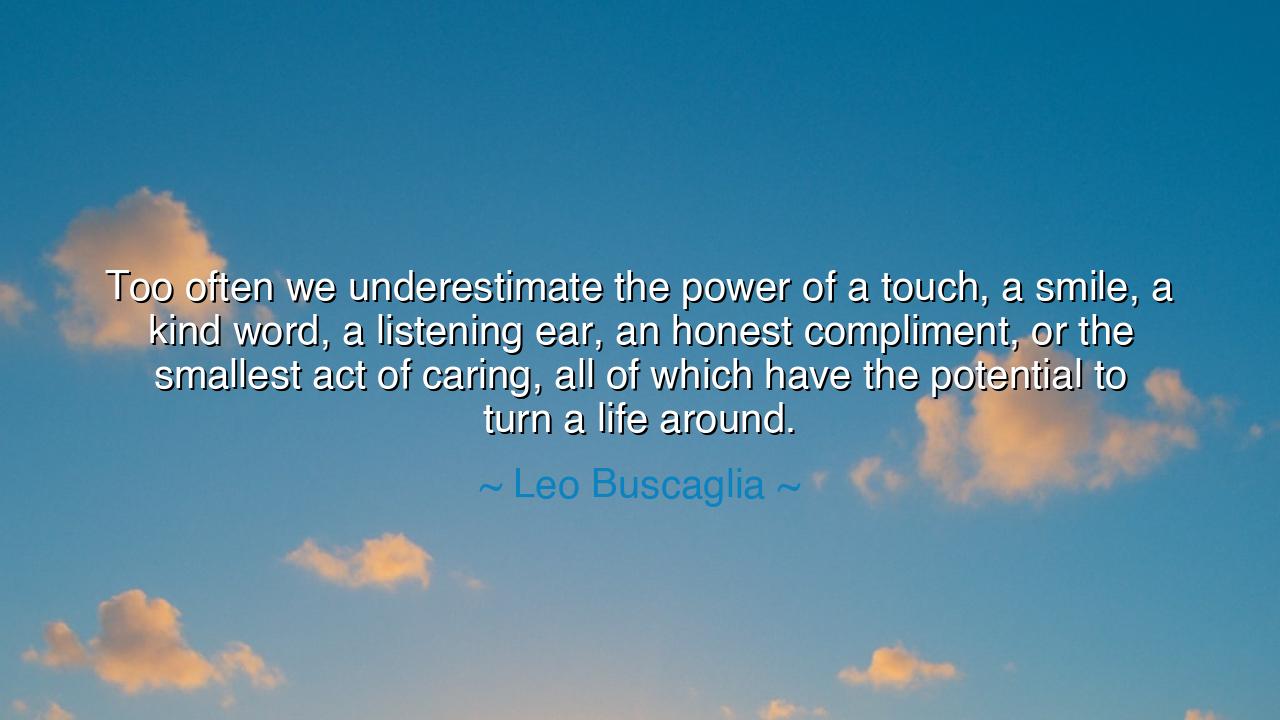
Too often we underestimate the power of a touch, a smile, a kind
Too often we underestimate the power of a touch, a smile, a kind word, a listening ear, an honest compliment, or the smallest act of caring, all of which have the potential to turn a life around.






In the grand sweep of life, where the powerful forces of time, fate, and human ambition often dominate our focus, the words of Leo Buscaglia resonate like a gentle call to our hearts: "Too often we underestimate the power of a touch, a smile, a kind word, a listening ear, an honest compliment, or the smallest act of caring, all of which have the potential to turn a life around." These words remind us of a truth that has echoed through the ages—that the smallest acts of kindness, those that cost us little but mean everything to others, have the power to heal, uplift, and transform. In a world so often preoccupied with grand gestures and achievements, we can easily forget the transformative potential of the simplest forms of human connection.
In the ancient world, where the struggles of daily life were often harsh and survival was uncertain, people understood the power of compassion and connection. The Greeks, who valued philosophy and humanistic thought, spoke of the concept of agape—a selfless love that transcends personal gain. The Stoics, like Epictetus and Marcus Aurelius, believed that even in the face of adversity, the act of showing kindness to others was a reflection of one’s moral strength. Their teachings emphasize that it is in gentleness and compassion—through small, everyday acts—that we can live virtuous lives and bring about real change. The power of a smile or a listening ear was not just an act of charity, but a reflection of the divine in human form, a recognition of the interconnectedness of all souls.
Consider the ancient practice of hospitality, where offering food, shelter, and kindness to a stranger was considered sacred. In the Old Testament, for example, Abraham entertained three strangers, unknowingly welcoming angels into his home. The gift of listening, the simple act of showing someone they are seen, was considered a high moral duty. It was through such acts of kindness that communities were bound together, finding strength not in wealth or conquest, but in the human connection that transcended circumstances. The smallest act—like the touch of a hand, a smile shared in silence, or a word of encouragement—had the potential to change the course of someone’s life, for in those moments, they knew they were not alone.
In our own time, real-life stories bear witness to the truth of Buscaglia’s words. One such story is that of Malala Yousafzai, whose life was changed not just by global movements or political action, but by the quiet yet profound support of those who believed in her. As a young girl in Pakistan, Malala’s passion for education was nearly crushed by oppressive forces, but the words of her father and the simple act of support from her family and community gave her the strength to continue. When she was shot by the Taliban for advocating girls' education, her survival and recovery were not just the result of medical care, but the culmination of years of small acts of kindness, encouragement, and love from those who refused to let her dream die. Her life is a powerful reminder that the smallest acts of caring, even in moments of fear and oppression, can lead to profound transformation.
The power of touch and compassionate words also play an undeniable role in the healing process. Mother Teresa, whose life was dedicated to the service of the poorest of the poor, understood this truth better than anyone. She often spoke of the importance of showing love and kindness to those who had been abandoned by society. One of her most famous quotes is: “Not all of us can do great things. But we can do small things with great love.” It was through the smallest of acts—holding the hand of the dying, offering a kind word to the suffering—that she was able to bring hope and dignity to those who had none. The lesson from her life is clear: kindness, no matter how small, is never insignificant.
In our own lives, we are often confronted by the opportunity to offer small acts of kindness to those around us. Whether it is offering a smile to a stranger, listening attentively to someone in need, or offering a simple compliment, we can never underestimate the potential impact these small gestures can have. As Buscaglia reminds us, these acts may seem insignificant, but their power is far-reaching. In times of personal struggle or emotional turmoil, it may be the simple act of caring that provides someone with the strength to keep moving forward. It is through compassion and gentleness that we not only transform the lives of others but enrich our own soul.
The lesson we take from these teachings is not merely to engage in acts of kindness but to make kindness the very fabric of our daily lives. The practical action we must take is simple: we must be aware of those around us who may be suffering, even in silence. A touch, a word, a smile—these are not small things; they are the seeds of hope, the foundations upon which great changes are built. Let us live with intentional compassion, showing that even in the smallest act, we have the power to change the world around us. And in doing so, we honor the truth that love and kindness are the most enduring forces in the human experience.






AAdministratorAdministrator
Welcome, honored guests. Please leave a comment, we will respond soon